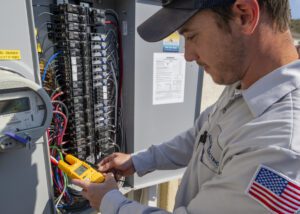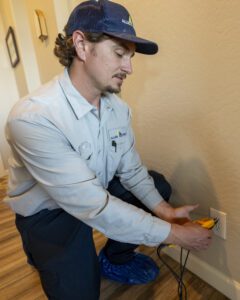How to Ensure Your Older Home Passes an Electrical Safety Inspection
Hey there! So, you’ve got yourself an older home, huh? Pretty cool, right? All that history and character… but man, sometimes these old places can be a real pain in the neck, especially when it comes to electrical stuff.
You know what I’m talking about – those weird old outlets that don’t quite fit your phone charger, or that one light switch that makes a funky noise when you flip it. Ever wonder if all that ancient wiring is safe? Yeah, me too.
Why Should You Care?
Picture this: You’re chilling on your vintage couch, binging your favorite show, when suddenly – zap! – the power goes out. Or worse, you smell something burning. Yikes! That’s the kind of nightmare scenario we’re trying to avoid here.
The Risks of Ignoring Inspections
Neglecting electrical safety can lead to serious consequences. Faulty wiring is a leading cause of house fires, and electrical shocks can result in severe injuries or even fatalities. Regular inspections help prevent these risks by catching problems early. They also ensure your home complies with local building codes, which is vital if you plan to sell your property.
Peace of Mind for Homeowners
Knowing your older home has passed an electrical safety inspection offers peace of mind. You’ll know that your electrical system is up to modern standards and that your family is safe from potential hazards. This small investment in safety can save you from significant repair costs and heartache down the line.
Common Electrical Issues in an Older Home
Now, I’m not trying to freak you out or anything. But let’s face it, our grandparents didn’t have to worry about powering up laptops, smartphones, and maybe an electric car on top of all the usual stuff. These old electrical systems are working overtime!
Outdated Wiring
Homes built before the 1960s often have knob-and-tube wiring, which is no longer considered safe. This type of wiring lacks grounding, increasing the risk of electrical shock. Inspectors will check for this and recommend updating to modern, grounded wiring.
Overloaded Circuits
Older homes weren’t designed to handle today’s electrical demands. Modern appliances and electronics can easily overload older circuits, leading to frequent tripping of breakers or blown fuses. Inspectors will assess the load capacity of your circuits and suggest upgrades if needed.
Lack of Ground Fault Circuit Interrupters (GFCIs)
GFCIs are essential in areas where water and electricity are close, like kitchens and bathrooms. They prevent electrical shocks by cutting off power if a fault is detected. an older home will often lack these devices, so inspectors will check and recommend installation where necessary.
Calling in the Pros
If you’re feeling brave, you could call in an electrician for a check-up. Yeah, it might cost you a few bucks, but think of it like this: it’s cheaper than replacing all your stuff after a fire. Plus, peace of mind? Priceless.
Upgrade Where Necessary
If your home has outdated wiring, an old electrical panel, or lacks GFCIs, consider making these upgrades before the inspection. While this may involve upfront costs, it can prevent future problems and enhance the safety of your home.
What to Expect During the Inspection
When the pro comes in, they’ll poke around, test some things, and probably mutter a lot about “code violations” (don’t worry, it’s not as scary as it sounds). They might find some issues, but hey, better to know about them now than when you’re standing outside in your PJs watching firefighters do their thing, right?
Thorough Examination
Inspectors will conduct a comprehensive review of your electrical system. This includes checking the wiring, electrical panels, outlets, switches, and circuit breakers. They will look for signs of wear, damage, or non-compliance with current codes.
Testing and Measurement
To ensure everything is functioning correctly, inspectors will test outlets and switches for proper operation. They may use specialized tools to measure voltage, current, and resistance. This helps identify underlying issues that aren’t visible to the naked eye.
Safety Recommendations
After the inspection, the inspector will provide a detailed report of their findings. This will include any areas that require attention and recommendations for improving your electrical system. If any critical issues are found, they may suggest immediate action to mitigate risks.
Why It’s Worth the Hassle
Look, I get it. Dealing with house stuff can be a total drag. But think of it this way: you’re protecting your cool old house and all your stuff. Plus, if you ever decide to sell, buyers love hearing that the electrical system isn’t a ticking time bomb.
Early Detection of Problems
Regular inspections help catch potential problems early before they become serious hazards. This proactive approach can prevent costly repairs and emergencies down the line.
Maintaining Property Value
A well-maintained electrical system adds to your home’s value. Buyers are more likely to purchase a property that has been recently inspected and certified as safe. This can give you a competitive edge if you decide to sell.
Enhanced Safety
Above all, regular inspections ensure your home remains a safe place for your family. They reduce the risk of electrical fires, shocks, and other hazards, providing peace of mind year-round.
The Bottom Line
So what do you say? Ready to give your home’s electrical system some TLC? Trust me, future you will be patting present you on the back for being so darn responsible. And who knows? Maybe you’ll sleep a little easier knowing your vintage palace isn’t going to spontaneously combust. Worth a shot, right?
